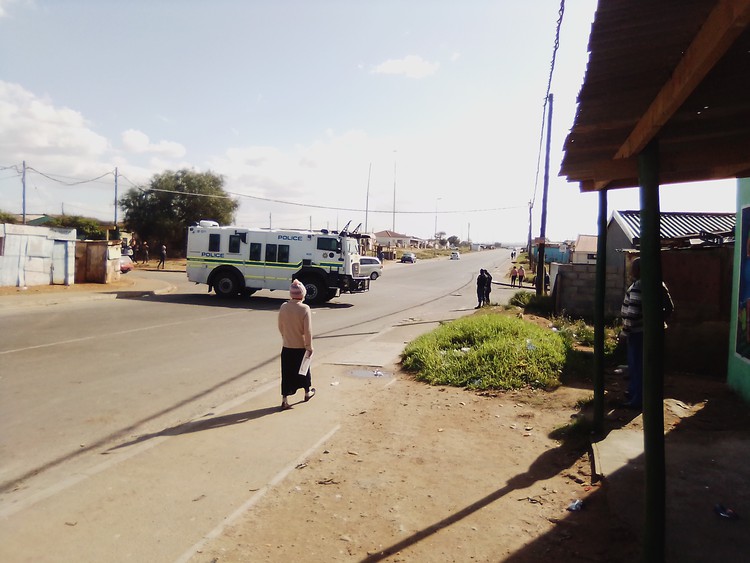Taxi drivers arrested during violent protest granted bail
The court has forbidden them from participating in protests
Police blocked the road to the court in Motherwell, Gqeberha on Thursday where six taxi drivers appeared on public violence charges for last week’s protests. They were released on R500 bail each. Photo: Joseph Chirume
Six men who were arrested during violent protests by taxi drivers in Gqeberha last week have been granted R500 bail each.
The taxi drivers, aged between 22 and 53, appeared in the Motherwell Magistrates Court on Thursday facing charges of public violence and damaging infrastructure.
During the most recent protest, roads across the city were blocked, street lights and robots were uprooted, and vehicles were set alight including eight buses owned by Algoa Bus Company. Protesters also forced the closure of clinics, schools, shopping centres and disrupted many other vital services.
The protest was suspended after talks between operators and drivers mediated with Nelson Mandela Bay Municipality Mayor Nqaba Bhanga. The protesters were demanding answers about their Unemployment Insurance Fund (UIF) Temporary Employer/Employee Relief Scheme (TERS) money.
On Thursday, relatives and other taxi drivers gathered outside court while a dozen police officers monitored the group and blocked off the area around the court.
National Prosecuting Authority regional spokesperson Anelisa Ngcakani said the accused were granted bail on condition that they not interfere with the investigation and do not participate in any protests.
They are due back in court on 16 July.
Next: Cape Town golf clubs may be turned into housing - City documents
Previous: City of Cape Town to evict dozens of Observatory residents
© 2021 GroundUp. This article is licensed under a Creative Commons Attribution-NoDerivatives 4.0 International License.
You may republish this article, so long as you credit the authors and GroundUp, and do not change the text. Please include a link back to the original article.
We put an invisible pixel in the article so that we can count traffic to republishers. All analytics tools are solely on our servers. We do not give our logs to any third party. Logs are deleted after two weeks. We do not use any IP address identifying information except to count regional traffic. We are solely interested in counting hits, not tracking users. If you republish, please do not delete the invisible pixel.



